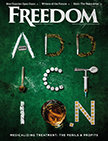Just how easy is it for a child to get an ADHD diagnosis?
Jennifer Johnson-Lankheim finds out
In my job as Freedom Editor, I worked on “It doesn’t ADD up” and found myself wondering. I’m also a mom, so I know the first place parents turn when they have a concern about their kids: the Internet.
I googled “Does my kid have ADHD” and found the psychcentral.com “Child Attention-Deficit Disorder (ADD/ADHD) Test.”
Though this was a highly unscientific inquiry, I did a little due diligence: the test is based on Diagnostic Statistical Manual-5 criteria and other screening measures for ADD/ADHD, and was reviewed by a doctor.
I figured my 12-year-old daughter an excellent ‘test subject,’ as never has there been a child so NOT afflicted with ADD or ADHD. The kid can focus. She reads 900-page books over a long weekend, is teaching herself Japanese—you get the idea. If she scores ‘on the spectrum,’ anyone can.
So, here goes.
Does your child have difficulty sustaining attention while doing things?

How often does your child avoid, dislike, or is reluctant to engage in tasks that require sustained mental effort or thought?

She avoids doing hard things whenever possible, preferring easy things, and is sufficiently reluctant to do book reports and similar “tasks that require sustained mental effort” so as to require that I nag. What she likes and is eager to engage in is watching Japanese anime on Netflix and playing Draw Something on her iPhone.
How often does your child have trouble listening to someone, even when they are spoken to directly, like their mind is somewhere else?

EVERY HOUR OF EVERY DAY—she never listens! Since there is no “always” option, OFTEN.
How often does your child lose, misplace or damage something that they need in order to get things done (e.g., school materials, pencils, books, tools, etc.)?

“Where is my THIS?” “Where is my THAT?” (like I should know) is a constant refrain.
How often does your child have trouble following through on instructions, or failing to finish schoolwork, chores, or other duties?

Okay, this is getting repetitive. YES, ALWAYS, WITHOUT END she ignores me and flakes on her chores.
How often is your child unable to play or engage in playtime or leisurely activities quietly?

Finally, some variety. She is a very quiet, mellow girl. I can safely say NEVER.
How often does your child blurt out an answer before a question has been completed?

This would also be known as “interrupting,” no? On the rare occasion she’s listening to me and her mind hasn’t wandered elsewhere, she has no qualms about interrupting.
Psychcentral.com’s “Child Attention-Deficit Disorder (ADD/ADHD) Test” has 17 questions in total (you can easily find it online). I only detailed seven, for the sake of space, but I did answer and score them all for my little experiment.
My daughter—who has never in her life given off a whiff of attention deficit—got ‘40’ on a scale where anything above 24 indicates that I should see a mental health professional for diagnosis and treatment of ADHD, per the quiz intro. A score as low as 12 indicates “some ADHD symptoms.” My kid, again at 40, is in the high range of ‘Moderate ADHD’—two more points and, I suppose, she’d be a hard case.
The psychcentral.com ADD/ADHD test, like all online medical content, comes with a disclaimer:
You should not take this as a diagnosis of any sort, or a recommendation for treatment.
I know where I’ll take it—the trash. With one or two exceptions, the questions on the ADD/ADHD screening were such that pretty much every member of the human race would answer “sometimes” or “often”—the “danger zone” for ADD/ADHD.
How indicative this particular screening is of those used in real diagnostic situations, I don’t know. It is based on screenings used clinically, and to my untrained eye, it seems like just the kind of vague, overly generalized criteria that would have to be in play for an overwhelming one in five kids to be slapped with ADD and ADHD labels. And, as you’ll read in this Freedom, there are many questions about these alphabet-soup diagnoses and the drugs used to treat them.
Parents—use your brain. Your kid may be a restless, irritating, selfish little grubber who talks too loud, moves too much, and bugs the teacher. But that doesn’t mean he/she has a developmental disorder. If it’s suggested he/she does—by a school official, an Internet quiz, or even the family doctor, be wary. And do your homework—that is, if your mind doesn’t start to wander.






























I’d venture to say most children, and maybe even most people, fall into the “often” category. As mentioned, my kid is particularly—often irritatingly—focused, but she is a human being, so—yeah—occasionally she has difficulty paying attention for long periods.